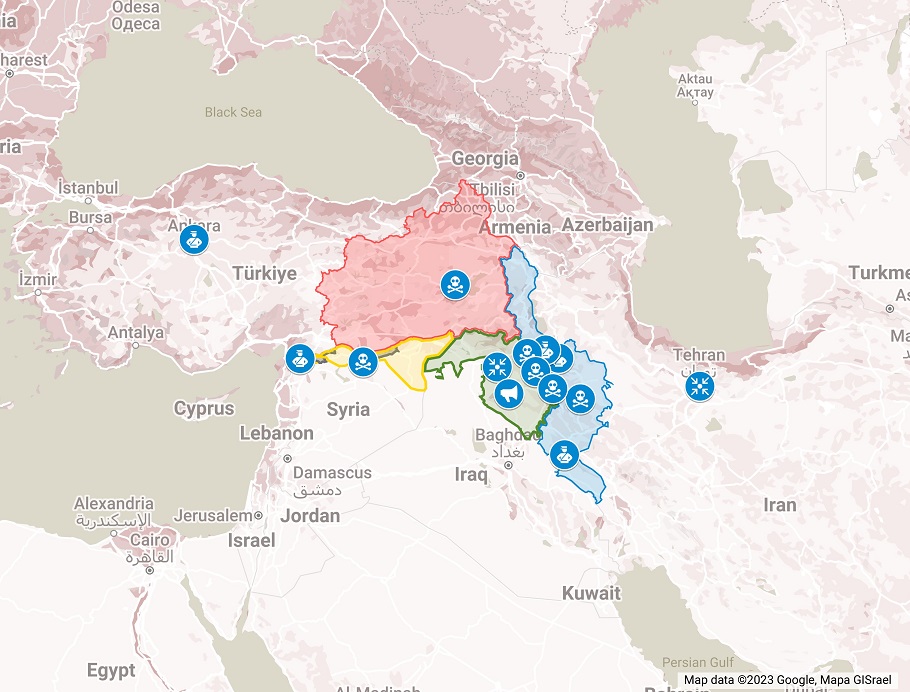1.7K
A weekly brief of events occurred in the Kurdistan regions of Iran, Iraq, Syria, and Turkey.
Iran
- The Iranian regime arrested at least 15 people in Senna, Shabad, Sardasht, Saqqez, Kermanshah, Awadam, Bokan, Marivan, Ilam, and Quchan. Among the detained were three females, including a 16-year-old teenager. At the same time, Iranian courts sentenced several Kurdish protesters and activists to prison. Mehdi Ghayas was sentenced to six months in prison in Ilam, Arsalan Mahmudi received a three-year sentence in Mehabad, and a female activist named Freshta Mansouri was given a six-month sentence in Sarbaleh. Meanwhile, the Hengaw Organization for Human Rights warned that three Kurdish men may face execution for participating in anti-government protests last year. Lastly, Iranian border guards killed a border porter (kolbar) near Sardasht, and Iraqi forces wounded another near Choman.
- The U.S. and Iran reached a tentative deal to release five Americans in Iranian custody in exchange for the unfreezing of approximately six billion dollars of Iranian assets in South Korea. Qatar mediated the deal, which is slated to take effect in September. Numerous Republicans, including Representative Michael McCaul, rejected the deal, but Representative Adam Smith defended the agreement by saying, “It’s Iran’s money that was sitting in South Korea, so it’s not a bounty.” The agreement did not reduce tensions in the Strait of Hormuz, however, as the U.S. plans to deploy Marines on commercial ships to prevent the Iranians from seizing them.
Iraq
- The Iraqi government and the Kurdistan Regional Government (KRG) formed a joint committee to negotiate a new oil and gas law that will then be submitted to the Council of Representatives. Iraqi Prime Minister Mohammed Shia Al Sudani met with the Iranian-backed “Coalition Framework” to discuss potential legislation amid disagreements with the KRG. Concurrently, five foreign oil companies operating in Iraqi Kurdistan (DNO, Gulf Keystone, HKN, Genal Energy, and ShaMan Petroleum) called for the Iraqi government to respect their contracts with the KRG. The KRG announced it was sending a delegation to Baghdad on Tuesday to resume talks, demanding that any law must gain acceptance from the KRG, oil-producing governorates, and the Iraqi government as outlined in the Constitution of Iraq.
- On August 12, a Turkish drone struck a vehicle near Penjwen district, killing three civilians, including a 17-year-old girl medical school student, and her father. Initial reports claimed that the vehicle has “PKK” members. However, it turned out later that all passengers were civilians, originally from Mosul, but resided in Dohuk. At least 115 civilians have been killed by Turkey in Iraqi Kurdistan since 2015.
- Sixteen political parties and coalitions registered to compete in Iraq’s provincial elections scheduled for December 18, 2023. Iraq’s Kurds, despite multiple attempts, failed to form a unified list and will instead be represented by four major coalitions. Iraq’s Arabs also failed to create a unified list and will be represented by three main coalitions, while the Turkmen community will present two lists. Notably, none of the above-mentioned lists included Iranian-backed parties like Badr, which are expected to participate in the December elections and are certain to make moves in Kirkuk Governorate.
Syria
- On August 9th, Turkish artillery directed its fire towards the Shirka village situated south of the M4 highway, resulting in the death of three civilians, including a grandmother and two children. Moreover, three individuals sustained injuries. All the victims hailed from the same family. The Syrian Democratic Forces (SDF) issued a statement denouncing the Turkish occupation army and its associates for persistently violating the ceasefire agreement. The SDF highlighted the urgent need for action from both the guarantors of the agreement and the international community, along with human rights organizations, to promptly halt the continued acts of aggression and transgressions by the occupying forces. In response, Vedant Patel, the spokesperson for the US Department of State, emphasized that no authorization or consent had been granted for Turkish operations. Patel called upon all parties involved to uphold and show reverence for the existing ceasefires. In another incident in the Turkish-occupied Afrin, factions supported by Turkey abducted three Kurdish civilians. Subsequently, two of the abducted individuals were released after a ransom was paid.
Turkey
- A report from Bianet.org claimed the Turkish Armed Forces arbitrarily detained nine Kurdish civilians in a village in Bitlis’s (Bidlîs) Tatvan (Tetwan) District. The report also said two other villagers remain missing. The arrests followed an August 10 clash between Turkish forces and the Kurdistan Workers’ Party (PKK). Fecri Çelik, a lawyer representing a detainee named Kerem Avras, released photos indicating his client had been tortured. Several sources alleged the Turkish military is also mistreating the other eight detainees. In April 2020, Human Rights Watch released a report detailing the increasing number of forced disappearances and instances of torture that coincided with Turkey’s authoritarian turn under the rule of President Recep Tayyip Erdogan.
- The 29th hearing of the Kobanî trials, referred to as the “Kobanî Conspiracy Trials” by the pro-Kurdish People’s Democratic Party (HDP), took place last week. 108 HDP politicians, 18 of whom are imprisoned, remain on trial for protesting ISIS’s (Da’esh) attack on Kobani in October 2014, and numerous HDP politicians are testifying about their participation in vigils expressing solidarity with Kobanî’s defenders. The Turkish government is attempting to depict the protests and vigils as support for the PKK because they allege the YPG, which defended Kobanî, is linked to the PKK. The fact the PKK is a terrorist organization under Turkish law means any support for it is a serious crime whose penalties could include closure for a political party like the HDP. That said, the HDP has repeatedly drawn attention to the questionable reliability of the evidence presented against the accused and the undemocratic nature of the trial.

